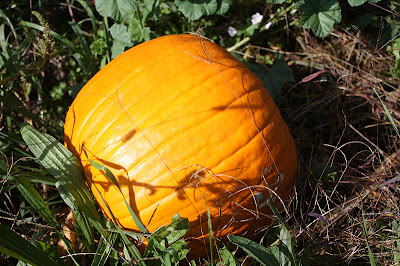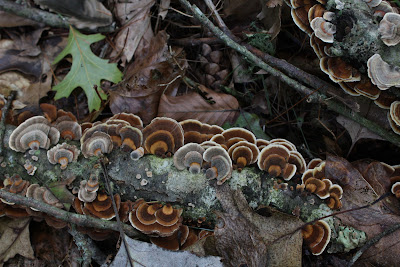In times of stress, it's easy to forget to do simple things that will keep you healthy and limit the impact of stress. I'm as guilty of this as anyone.
Our family has had some fairly significant stressors lately. When I'm stressed, my shoulders rise up to meet my ears, I become impatient, and I don't sleep well. I know what I need to do in these times. For me, practicing yoga, getting a chiropractic adjustment, or meeting a friend for coffee and conversation all help. On Tuesday, I realized I had recently done each of those things but it wasn't enough. I felt scattered and ungrounded.
The solution? Time in nature. In fact, literally time on the ground at several points. I grabbed a small backpack, some water, my notebook/pen, and my camera. As I set out for a walk in the woods, I had no plan. I just knew I needed to move my body and to spend time in nature. As I stepped out my back door, I noticed these cute little mushrooms in my herb garden.
As I approached the first bend in the trail, I felt myself start to relax.
By the time my house was out of sight, my breathing had deepened and my shoulders had dropped.
Perhaps one hundered feet later, I noticed this mushroom. Purple! Can you believe it?
And thus my adventure was born... Mushroom hunting! I spent the next hour wandering along, looking for mushrooms. (To see more mushroom photos, come back next Wednesday for Wordlesss Wednesday). I crouched down low and even laid right down in the damp soil and moss to get close up photos. I found purple, white, orange, brown, and red mushrooms. I found them growing on soil, leaves, trees, and fallen logs. I found the tiniest little mushrooms whose tops were no more than 1/8 of an inch across and one that was nearly 4 inches across.
I'm not a professional photographer, but it doesn't matter. I was totally lost in the experience. An hour pased but it only felt like minutes. Not once did I think about all the things I would have been thinking about if I weren't in the woods.
I know nature rejuvenates me. Heck, I blog about getting out into nature. I'm Nature Girl. Why didn't I get out there sooner? Perhaps for the same reasons you may not get out as often as you should- life gets busy and you go from one responsibility to the next to the next. Perhaps you go into survival mode in times of extreme stress and don't go outside at all. Here's the truth, though. To really survive it, we NEED to be outside. We NEED time in nature to be healthy, well-adjusted beings. Our kids need it, too.
There's loads of research to support this. If you want to know more, check out the
Children and Nature Network website. (Or, go directly to the
Research and Resources page). Then grab your kids and get outside.
How does time in nature support your well-being?















































